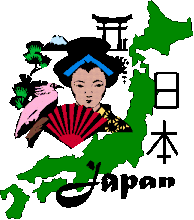Cicada
 Cicada, otherwise know in Japanese has 蝉 - せみ - Semi.
Cicada, otherwise know in Japanese has 蝉 - せみ - Semi.Not only are these insects relatively large, they are also very, very noisy. The noise is deafening and their constant drone which sounds like 'Si si si si si' is none stop day and night. The nearest we have in the UK to the sound of cicada's is that of crickets, but imagine the sound of crickets but a 100 times louder that is kind of like the sound of cicada. Now Japanese children love to catch cicada and you will often see Japanese children in the parks or countryside with nets.
An example sentence:
子供は網で蝉を捕まえた。
こどもはあみでせみをつかまえた。
Kodomo wa ami de semi wo tsukamaeta.
Children caught cicadas with a net.
Yukata
 Yukata or in Japanese 浴衣 - ゆかた - Yukata
Yukata or in Japanese 浴衣 - ゆかた - YukataYukata are a light cotton kimono which is often worn in the summer, especially when attending a fireworks display or a festival. Yukata's are often given in Japanese style hotels, and at Onsen (Hot Springs)
An example sentence:
浴衣を履きましょう。
ゆかたをはきましょう。
Yukata wo hakimashou.
Let's wear Yukata.
Fireworks
 Fireworks, in Japanese: 花火 - はなび - Hanabi.
Fireworks, in Japanese: 花火 - はなび - Hanabi.The Japanese love their fireworks. Nearly every town and city will have a firework display at least once during the summer. It is like a mini festival in itself, with lots of stores selling sweets and food and various other goods. friends, lovers, families with children all gathering together and sitting down ready to watch the fireworks. There will be women, children and men dressed in yukata. Then eventually the fireworks display will start and there will be plenty of 'Oooohs' and 'Aaaaahs' with typical Japanese words being spoken to one another such has 'Sugoi' and 'Kirei'
An example sentence:
空は花火で光ります。
そらははなびでひかります。
Sora wa hanabi de hikarimasu.
The fireworks light up the sky.
Festivals
 Another common sight in Japan during the summer are festivals. The Japanese for festival is: 祭り - まつり - Matsuri.
Another common sight in Japan during the summer are festivals. The Japanese for festival is: 祭り - まつり - Matsuri.The festivals can range from a school festival, a local village or town festival or to more larger festivals such as Obon. There are festivals held through out the year in Japan but during the summer there seems to be a festival at least once every week being held somewhere or another.
An example sentence:
私は祭りを楽しかった。
わたしはまつりをたのしかった。
Watashi wa matsuri wo tanoshikatta.
I enjoyed the festival.

No comments:
Post a Comment